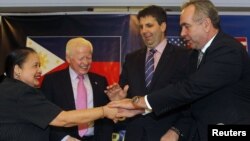MANILA —
Philippine and U.S. officials are working for closer diplomatic and defense ties between their countries. Simone Orendain reports from the Philippine capital the officials were meeting in Manila as North Korea launched a long-range rocket.
The Philippine Department of Foreign Affairs said the meeting Wednesday came up with “work plans” that will result in “stronger and closer cooperation between the two countries.” The officials said they are looking for closer maritime, defense and economic ties, diplomatic engagement, and support for the rule of law.
The two countries have shared a mutual defense treaty for more than 50 years, under which U.S. troops have had some sort of presence in the Philippines.
There were several U.S. military bases in the Philippines from 1898 until 1992. Since the countries signed a visiting forces agreement in 1999, U.S. military visits and port calls have been more frequent.
Philippine Defense Undersecretary Piolo Lorenzo Batino said those visits will include more training and exercises for the Philippine military. They would be geared towards maritime security, disaster and humanitarian activities.
“There is a need to further flesh out all of these concepts for increased rotational presence. It is going to be a very significant development in our relationship,” said Batino.
The Philippines has said it wants to be in a better position to defend its claims in the South China Sea. Vietnam, Taiwan, Malaysia, and Brunei also have contesting claims, while China says nearly the entire sea is its domain.
A Philippine foreign affairs official said earlier this week the Philippines sees the United States as a party that can help to put it in a better position. While the United States maintains neutrality in the territorial disputes, it gives defense consultation to the Philippines according to terms of the Mutual Defense Agreement.
U.S. State Department Assistant Secretary Kurt Campbell who attended the talks said the two countries’ relationship is “on an upswing” and it has strengthened strategically, politically, economically and militarily in recent years. He emphasized a need for both countries to work as equal partners.
Campbell also expressed gratitude to the Philippines over its reaction to Wednesday’s long-range rocket launch by North Korea.
“Let me also thank, if I can, the Philippine government, for its strong solidarity, standing with international community condemning the missile test that has been conducted by North Korea," said Campbell. "This is a provocative act.”
The Philippines’ presidential spokesman put out a statement saying it “strongly condemned” the launch, saying North Korea violated international law. The Philippines, which lies below the path of any southward rocket launched from North Korea “firmly urges” that country to “desist from provocative actions.”
The second stage of the rocket fell into waters 300 kilometers east of the Philippines’ northern-most province. The Office of Civil Defense said Navy and Coast Guard personnel went to inspect the area.
The Philippine Department of Foreign Affairs said the meeting Wednesday came up with “work plans” that will result in “stronger and closer cooperation between the two countries.” The officials said they are looking for closer maritime, defense and economic ties, diplomatic engagement, and support for the rule of law.
The two countries have shared a mutual defense treaty for more than 50 years, under which U.S. troops have had some sort of presence in the Philippines.
There were several U.S. military bases in the Philippines from 1898 until 1992. Since the countries signed a visiting forces agreement in 1999, U.S. military visits and port calls have been more frequent.
Philippine Defense Undersecretary Piolo Lorenzo Batino said those visits will include more training and exercises for the Philippine military. They would be geared towards maritime security, disaster and humanitarian activities.
“There is a need to further flesh out all of these concepts for increased rotational presence. It is going to be a very significant development in our relationship,” said Batino.
The Philippines has said it wants to be in a better position to defend its claims in the South China Sea. Vietnam, Taiwan, Malaysia, and Brunei also have contesting claims, while China says nearly the entire sea is its domain.
A Philippine foreign affairs official said earlier this week the Philippines sees the United States as a party that can help to put it in a better position. While the United States maintains neutrality in the territorial disputes, it gives defense consultation to the Philippines according to terms of the Mutual Defense Agreement.
U.S. State Department Assistant Secretary Kurt Campbell who attended the talks said the two countries’ relationship is “on an upswing” and it has strengthened strategically, politically, economically and militarily in recent years. He emphasized a need for both countries to work as equal partners.
Campbell also expressed gratitude to the Philippines over its reaction to Wednesday’s long-range rocket launch by North Korea.
“Let me also thank, if I can, the Philippine government, for its strong solidarity, standing with international community condemning the missile test that has been conducted by North Korea," said Campbell. "This is a provocative act.”
The Philippines’ presidential spokesman put out a statement saying it “strongly condemned” the launch, saying North Korea violated international law. The Philippines, which lies below the path of any southward rocket launched from North Korea “firmly urges” that country to “desist from provocative actions.”
The second stage of the rocket fell into waters 300 kilometers east of the Philippines’ northern-most province. The Office of Civil Defense said Navy and Coast Guard personnel went to inspect the area.




